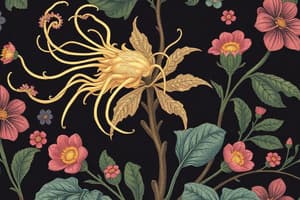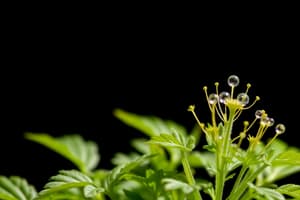Podcast
Questions and Answers
What does the lab have?
What does the lab have?
- A single test on Curol synthesis
- Seven tests that look at various plant characteristics (correct)
- Comparative analysis of animal species
- Four tests focusing on structural characteristics
What are the structural characteristics of plants?
What are the structural characteristics of plants?
Test 1
What are the structural characteristics of seeds?
What are the structural characteristics of seeds?
Test 2
What does Test 3 analyze?
What does Test 3 analyze?
What is the purpose of Test 4?
What is the purpose of Test 4?
What indicates the presence of enzyme M in Test 5?
What indicates the presence of enzyme M in Test 5?
What does Test 6 utilize to compare DNA?
What does Test 6 utilize to compare DNA?
Botana curus is a?
Botana curus is a?
What does gel electrophoresis do?
What does gel electrophoresis do?
What is the function of restriction enzymes?
What is the function of restriction enzymes?
DNA is a _________ charged molecule.
DNA is a _________ charged molecule.
During gel electrophoresis, DNA is put into ______.
During gel electrophoresis, DNA is put into ______.
Longer strands of DNA would stay towards ________ while shorter strands of DNA would stay toward ___________.
Longer strands of DNA would stay towards ________ while shorter strands of DNA would stay toward ___________.
The DNA separates by _______.
The DNA separates by _______.
What does Test 7 provide evidence for?
What does Test 7 provide evidence for?
What is Transcription?
What is Transcription?
What is Translation?
What is Translation?
What species was found to be most similar to Botana curus?
What species was found to be most similar to Botana curus?
What does an evolutionary tree show?
What does an evolutionary tree show?
What is another term for an evolutionary tree?
What is another term for an evolutionary tree?
What kind of evidence is most helpful for making decisions about relationships between species?
What kind of evidence is most helpful for making decisions about relationships between species?
What similarities do the four species share?
What similarities do the four species share?
Provide a biological answer for why the plants have similar characteristics.
Provide a biological answer for why the plants have similar characteristics.
What are some threats to Botana curus?
What are some threats to Botana curus?
List important reasons to preserve Botana curus.
List important reasons to preserve Botana curus.
What kind of value does Botana curus have?
What kind of value does Botana curus have?
What are arguments against preserving Botana curus?
What are arguments against preserving Botana curus?
Why is Botana curus considered a valuable plant?
Why is Botana curus considered a valuable plant?
What is curol?
What is curol?
What does curol do?
What does curol do?
Why is Botana curus a problem?
Why is Botana curus a problem?
Can we produce Botana curus in the lab?
Can we produce Botana curus in the lab?
Is Botana curus limited?
Is Botana curus limited?
Is Botana curus considered an endangered species?
Is Botana curus considered an endangered species?
What kind of evidence will be collected to compare species X, Y, and Z to Botana curus?
What kind of evidence will be collected to compare species X, Y, and Z to Botana curus?
What constitutes molecular evidence?
What constitutes molecular evidence?
What is the objective with Botana curus?
What is the objective with Botana curus?
Study Notes
Lab Overview
- Conducts seven tests assessing physical, chemical, and microscopic characteristics of plants potentially creating Curol.
- Aims to illustrate the importance of biodiversity through data comparisons.
Test Summaries
- Test 1: Evaluates structural characteristics of plants.
- Test 2: Examines structural characteristics of seeds.
- Test 3: Analyzes microscopic internal structures of stems.
- Test 4: Uses paper chromatography to separate plant pigments.
- Test 5: Indicator tests detect presence of enzyme M, indicated by fizzing.
- Test 6: Employs simulated gel electrophoresis for DNA comparison.
- Test 7: Investigates molecular evidence for interspecies relationships.
Key Concepts
- Botana curus is a fictitious plant significant for studies.
- Gel electrophoresis divides DNA into fragments, allowing analysis.
- Restriction enzymes cut DNA, facilitating fragment separation.
- DNA is a negatively charged molecule, impacting its movement in electrophoresis.
- In gel electrophoresis, DNA is placed in wells for testing.
DNA Behavior in Electrophoresis
- Longer DNA strands remain near the negative pole; shorter strands migrate toward the positive pole.
- DNA separation occurs based on size, aiding in genetic analysis.
Genetic Analysis Techniques
- Transcription converts DNA to RNA for mRNA synthesis.
- Translation processes RNA into amino acids, forming proteins.
- Analysis revealed that Species Z shares the most similarities with Botana curus across tests.
Phylogenetics
- An evolutionary tree illustrates genetic similarities and differences and is also known as a cladogram.
- Molecular evidence is crucial for determining species relationships, revealing potential for distinct cellular makeups despite similar traits.
Conservation Aspects
- All four studied species share similarities in paper chromatography and amino acid sequences, beginning with VAL.
- Possible shared characteristics stem from a common ancestral plant.
- Threats to Botana curus include pollution, overharvesting, and invasive species.
- Preservation of Botana curus is vital due to its production of Curol and its role in ecosystem stability.
Value of Botana curus
- Recognized for its medicinal, agricultural, and ecological value.
- Arguments against preservation suggest availability of alternative plants for Curol production and its slow growth rate.
- Valued for producing Curol, which is used in cancer treatment.
Conservation Status
- Botana curus grows slowly, complicating its production in labs, rendering it limited and classified as endangered.
Research Objectives
- Collect both structural and molecular evidence to compare Botana curus with species X, Y, and Z.
- Molecular evidence includes DNA, amino acids, and gel electrophoresis results.
- Comparative studies are geared towards understanding characteristics of Botana curus relative to other species.
Studying That Suits You
Use AI to generate personalized quizzes and flashcards to suit your learning preferences.
Description
This quiz evaluates knowledge on the physical, chemical, and microscopic tests conducted on plants, particularly focusing on a fictitious plant, Botana curus. Participants will explore various testing methods and their implications for understanding biodiversity.




